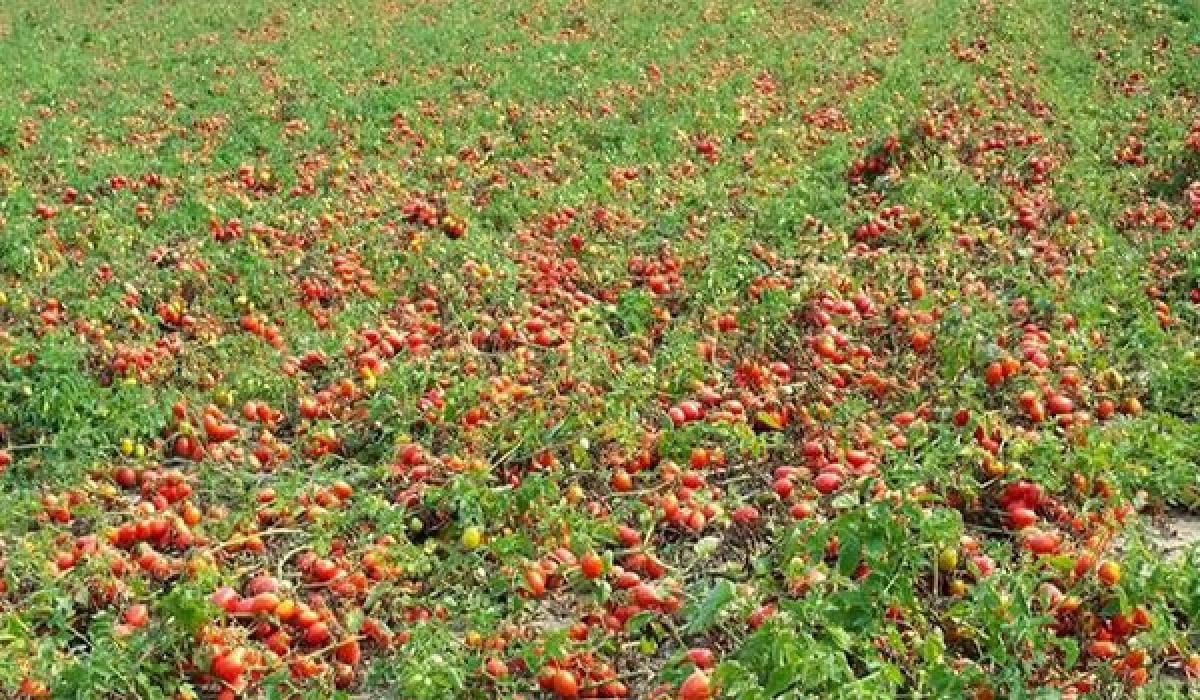Live
- Punjab DGP, MHA official request farmer leader Dallewal to end 20-day fast
- Stage Collapse During Swearing-In Ceremony of KUDA chairman in Kakinada
- Govt unveils ‘Jalvahak’ to boost inland waterways
- List of criminals: Delhi BJP chief on AAP panel of 38 candidates
- PSBs in India clock record Rs 1.41 lakh crore in net profit in FY24
- Telangana Government Announces Key Development Plans: Bhatti Vikramarka
- Crackdown on illegal poppy farming in Manipur: Assam Rifles destroyed 6,228 acres in 5 years
- South Korea's ruling party leader cancels press conference amid calls for resignation
- AIADMK's big meet discusses 2026 polls, prospective alliances
- BJP questions Congress-Shiv Sena (UBT) alliance over Aaditya Thackeray's Savarkar-Nehru remark
Just In

Chittoor farmers are again at the receiving end, this time due a variety of reasons. They are extending the crop area compared to last year in the summer and the subsequent increase in production of tomatoes, competition from the adjacent Karnataka farmers, recent lorry strike and its spillover effect lasting nearly three weeks and last but not least dwindled upcountry demand leading to the farmer
Tirupati: Chittoor farmers are again at the receiving end, this time due a variety of reasons. They are extending the crop area compared to last year in the summer and the subsequent increase in production of tomatoes, competition from the adjacent Karnataka farmers, recent lorry strike and its spillover effect lasting nearly three weeks and last but not least dwindled upcountry demand leading to the farmers this time forced to sell their tomatoes for less than Rs 1 per kg or abandoning the tomatoes in the field itself.
Highlights:
- Farmers abandon the tomatoes in the field as prices crash
- Lorry strike and competition from adjacent states led to fall in prices of tomatoes
According official sources, the farmers took up tomatoes in about 18,000 acres but unconfirmed reports say the crop area crossed 25,000 acres in Chittoor district.The crop was taken up by small farmers under bore-well irrigation with a fond hope of a getting a good revenue this time like last year summer in which tomatoes sold Rs 80-90 per kg. Enhanced awareness among the farmers on crop management coupled with the micro irrigation method opted by the farmers saw they reaping a good harvest this time despite very limited water sources.
But their expectations dashed to ground with the produce unable to get remunerative price.Kadapa Reddy, a farmer from Ramasamudram mandal, who cultivated tomato in four acres forced to leave it in the field as the price for the produce was just Rs 50 for a box containing 30 kilos. Talking to The Hans India, Reddy said, “after deducting transport, labour charges for loading (at the field) and unloading (in the agriculture market yard), commission to the agent at the market yard which is 10 per cent I may be left with just Rs 50-75 paisa per kg.
In other words, I will not get even what I invested on the crop,” he rued.The nine-day lorry strike had its effect spilled over to two weeks at the crucial time of the harvest of the crop sown in February hit the farmers hard. With no transport, the harvesting of tomatoes was put off for two weeks resulting in the farmers reaping the crop at a time after trucks resumed operation, flooding the local markets leading to steep fall in the prices of tomatoes. “We are still to recover from the glut, forcing many of us like me leaving the crop in the fields,” he explained.
Another farmer from Madanapalle said, “Karnataka farmers also dumping the tomatoes in the local markets while the farmers in Chhattisgarh and Madhya Pradesh also started cultivation of tomatoes. This dwindled our upcountry market adding more to our woes,’’ he said hitherto, daily 100 lorries of tomatoes sent from the district to far off New Delhi, Kolkata, Mumbai and other cities in the north. However, Srinivasulu Reddy a progressive farmer in Kalikiri mandal blamed the Horticulture department for not educating the farmers on the imminent need of crop diversion to avoid glut in tomatoes.
There should be seed and nursery accountability with regard to tomato, he said stressing on Horticulture department ensure it to have a correct picture on the total tomato crop area. This would avoid farmer taking tomato only during summer and go in for other crops. “Sensing the glut, I took up muskmelon and earned Rs 5 lakh,” he explained.A senior officer of the Horticulture department said that the glut is temporary and things would improve in a week or ten days allowing farmers to get remunerative price with the prospect of demand for tomato go up in May and June.

© 2024 Hyderabad Media House Limited/The Hans India. All rights reserved. Powered by hocalwire.com







